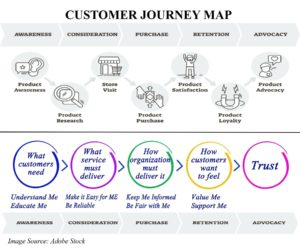Refine Your Brand Strategy to Thrive in Recession

Amid economic turmoil, businesses, both small and large, face uphill battles. During a recession, there is an unprecedented transformation that presents grand opportunities for entrepreneurs as well as considerable risks in the marketplace.
But, what are the likely risks during a recession? Consumers tackle financial constraints; patterns in consumer behavior shift as demands for products and services change; companies consider cutting costs to stay afloat; some fail, while others pursue a creative approach for survival and escape the cycle of competition, among other conditions. For example, “During 2009, when most companies were holding tight to ride out the recession storm, Lego’s profits soared 63%. Exploration of the global market was the key to this company’s recession-bucking [sic] success,” as revealed by Investopedia.
Yet, while a robust economy builds confidence, how can companies thrive in a recessionary period?
Several experts have shared insights on the subject, so let’s review their thoughts.
Optimizing Customer Experience

According to Nathan Beckord, co-founder and CEO at Foundersuite, “In a recession, customers expect more for their money, and your brand and value proposition must change to adapt. You may need to focus more on how you can reduce their costs or maintain their customers. We are refining our brand at Foundersuite.com to be more of a ‘we are in this with you’ emphasis, and we are launching more offerings to support this. Adapt or die!”

Anthony Miyazaki, brand strategist and marketing educator says, “Many people in business today haven’t experienced the need to keep their brands strong during a prolonged recession. Unfortunately, recessions are often when many companies fail—precisely because they didn’t have a strong brand strategy tailored to the economic conditions. In that many consumers and business segments cut back on large expenditures during recessionary times, this creates opportunities for brands to help their customers to downsize to some degree, as well as to focus on ways to get more value from the products they currently use. Brands that focus on building caring relationships with their target audiences during tough economic times will be the same brands that flourish when the economy bounces back.”

Brandon Diaz, marketing and digital services specialist at the Town of Miami Lakes adds, “Recessions represent great opportunities for brands that are in a position to capitalize on these situations. If you understand your consumer’s needs changing during a recession and filling those needs in unique ways, your brand can increase profit margin, pick up market share, and be in position for exponential growth once the market recovers. This just takes the right planning and foresight.”
Beckord, Miyazaki, and Diaz’s refining approach epitomizes customer experience. It is critical to diagnose and enhance the experience of the customer at each touchpoint in the buying process. Entrepreneurs who create a journey map for their customers will have a visual representation of each point in the customer journey. Take a look at a simple customer journey map.

This map shows the customers’ experience with a brand, that can help you strengthen your relationship with customers. Therefore, if a company capitalizes on developing customer relationships, there is an imminent potential to build loyalty that might spiral into brand equity. It is a powerful alliance that, even in tough times, can catapult brands above their rivals and dominate demand, paramount to thrive in a recession.
Analyzing the Market, Brands Performance and Emerging Trends
Brandon further suggests that “Brands can prepare for the next recession by using the following five methods:
- Reassess your brand position
- Do not cut marketing efforts
- Ensure to focus on a unique value
- Expand to new audiences
- Capitalize on opportunities
[Additionally], The most important factors are to be strategic about your brand decisions when things are going well, and to ensure that you are better prepared than your competition to capitalize on the recession.”

Kirk Buchanan, business intelligence analyst & digital entrepreneur states, “Uber, Slack, and Air BNB are just a few of the prominent companies that started during or after the 2008 recession. It’s rarely said, but recessions can present incredible opportunities for innovative people, companies, and brands looking for ways to redefine how business in certain sectors is conducted. Let’s look at Air BNB, for example, during the collapse of the US housing market, a group of guys had a brilliant idea of setting up a business that would make renting space easy for homeowners. While their primary objective may not have been to help with the housing crises, it became an avenue for many people to earn extra income and save their homes from foreclosure.
A big part of refining your brand strategy in a time like this has to do with how well you analyze the situation at hand and find meaningful solutions. It’s imperative for individuals, businesses, and brands to pay close attention [to the customer] and find a simple way to add value to their lives, much like Brian Chesky et al. did in 2008.”
As we can see, entrepreneurs who miss out on the golden opportunity to evaluate the market and lack foresight about their business performance and future trends, are more likely to be in a catastrophic situation. In recessionary times, brands that analyze data to understand how it can improve their customer experience and refine their strategy to take advantage of market growth and expansion are likely to prosper.
Introducing Digital Transformation
Buchanan further advocates, “It’s now 2020, and what worked in 2008 may not work today. […]. While housing was the center of attention in earlier days, […] the internet companies [now] dominate. Netflix, Amazon, Microsoft, among others, have all been doing well, while we watch the stock market crash. What we see now across the world will redefine how we learn, shop, and entertain forever. I think this opens enormous possibilities for people, brands, and companies that leverage the power of the internet to deliver these services.”

Also, Martin Pastorino, safety & security analyst at South Florida Regional Transportation Authority / Tri-Rail, shows that “No matter what type of service or product a brand offers, they should always be mindful of how they would approach moments of economic crisis. As technology has allowed us to be more connected than ever before, brands need to capitalize on this trend. […], gyms and fitness centers [for example] are [clearly being] hit hard with the coronavirus pandemic, as social distancing is preventing people from going to gyms and working out. However, with video conference apps such as Zoom, gym owners and trainers [are conducting] virtual sessions so that their clients can continue using their fitness services. Sure, it’s not the same as face-to-face training, but these sessions allow for fitness centers to maintain their clientele until the crisis blows over and they can reopen their physical locations.”
The digital world is seamlessly changing the way people do business. As apperceived by Buchanan and Pastorino, digital evolution provides brands with endless possibilities to connect with target audiences and flourish during tough times.
Conclusion
Recession offers an opportunity to refine your brand’s strategy to remain competitive in the marketplace. While some brands may extricate, those that invest in learning about consumer preferences during desperate times and adapting their brand strategies to suit their needs will thrive through a recession. The overarching negative customer experience is distasteful. Let’s take a look—”United Airlines had a brand crisis, in which $1.4 billion in value was wiped out overnight when a passenger’s experience went viral on social media,” as reported by Forbes. What would be the outcome of United Airlines if a recession was to take effect? When a customer has a fulfilling experience, as Buchanan highlights with Air BNB, the brand will have a compelling value proposition.
Also, it’s crucial to analyze data during a recession. It makes little sense to panic and slash marketing activities without gathering pertinent information. Brands powered by data to make educated decisions could survive the storm and succeed. Why? As the choices they make are not on gut feelings but guided by factual data—the desire of the customers and actual market conditions. That will help entrepreneurs focus on their unique brand value and remove themselves from the rivalry.
In a competitive and troubled world, brands no longer rely on conventional strategies to survive. As the experts endorse, those that learn to reinvigorate their strategies embracing the digital platforms, customer experience, and data analysis are likely to thrive as they chronicle through a time of recession.
So, What’s Next!
Are you prepared to thrive in a recession? Start analyzing your data, look for opportunities to refine your brand strategies, and get ready should a recession strike.
Consumers are the source of strength for a brand, fulfill their desires at every touchpoint and watch your brand soar amid rivalry and market conditions. —D. Salkey Robert
Learn more at brandzers.com. Please share your thoughts and comments!
Additional Source:
Forbes: Customer Experience is the New Brand
Investopedia: 6 Companies Thriving in the Recession





